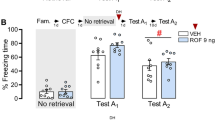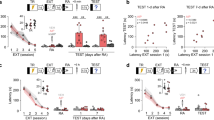Abstract
Fear memory retrieval can lead to either reconsolidation (accompanied or not by strengthening of the memory trace) or extinction. Here, we show that non-reinforced retrieval of inhibitory avoidance (IA) conditioning can induce memory strengthening assessed in a subsequent retention test trial. Infusion of the protein synthesis inhibitor cycloheximide or the mTOR inhibitor rapamycin into the rat basolateral complex of the amygdala (BLA) after a reactivation (retrieval) session impaired retrieval-induced strengthening. Intra-BLA infusion of the mRNA synthesis inhibitor 5,6-dichloro-1-beta-d-ribofuranosylbenzimidazole (DRB) after retrieval had no effect. These findings provide the first evidence suggesting that non-reinforced IA retrieval can lead to memory strengthening through a mechanism dependent on protein synthesis and mTOR activity in the BLA.




Similar content being viewed by others
References
Alberini CM (2005) Mechanisms of memory stabilization: are consolidation and reconsolidation similar or distinct processes? Trends Neurosci 28:51–56
Alberini CM (2009) Transcription factors in long-term memory and synaptic plasticity. Physiol Rev 89:121–145
Alberini CM (2011) The role of reconsolidation and the dynamic process of long-term memory formation and storage. Front Behav Neurosci 5:12
Amaral OB, Osan R, Roesler R, Tort AB (2008) A synaptic reinforcement-based model for transient amnesia following disruptions of memory consolidation and reconsolidation. Hippocampus 18:584–601
Blundell J, Kouser M, Powell CM (2008) Systemic inhibition of mammalian target of rapamycin inhibits fear memory reconsolidation. Neurobiol Learn Mem 90:28–35
Chuang JY, Lin KY, Cherng CG, Yu L (2012) Involvement of amygdaloid protein synthesis in early- and late-phase reconsolidation of emotion-related memories. Chin J Physiol 55:314–322
Comim CM, Constantino LS, Petronilho F, Quevedo J, Dal-Pizzol F (2011) Aversive memory in sepsis survivor rats. J Neural Transm 118:213–237
Costa-Mattioli M, Sossin WS, Klann E, Sonenberg N (2009) Translational control of long-lasting synaptic plasticity and memory. Neuron 61:10–26
Dudai Y, Eisenberg M (2004) Rites of passage of the engram: reconsolidation and the lingering consolidation hypothesis. Neuron 44:93–100
Duvarci S, Nader K, LeDoux JE (2005) Activation of extracellular signal-regulated kinase- mitogen-activated protein kinase cascade in the amygdala is required for memory reconsolidation of auditory fear conditioning. Eur J Neurosci 21:283–289
Duvarci S, Nader K, LeDoux JE (2008) De novo mRNA synthesis is required for both consolidation and reconsolidation of fear memories in the amygdala. Learn Mem 15:747–755
Eisenberg M, Kobilo T, Berman DE, Dudai Y (2003) Stability of retrieved memory: inverse correlation with trace dominance. Science 301:1102–1104
Hay N, Sonenberg N (2004) Upstream and downstream of mTOR. Genes Dev 18:1926–1945
Hoeffer CA, Klann E (2010) mTOR signaling: at the crossroads of plasticity, memory and disease. Trends Neurosci 33:67–75
Inda MC, Muravieva EV, Alberini CM (2011) Memory retrieval and the passage of time: from reconsolidation and strengthening to extinction. J Neurosci 31:1635–1643
Jobim PF, Pedroso TR, Christoff RR, Werenicz A, Maurmann N, Reolon GK, Roesler R (2012a) Inhibition of mTOR by rapamycin in the amygdala or hippocampus impairs formation and reconsolidation of inhibitory avoidance memory. Neurobiol Learn Mem 97:105–112
Jobim PF, Pedroso TR, Werenicz A, Christoff RR, Maurmann N, Reolon GK, Schröder N, Roesler R (2012b) Impairment of object recognition memory by rapamycin inhibition of mTOR in the amygdala or hippocampus around the time of learning or reactivation. Behav Brain Res 228:151–158
Lee JL (2008) Memory reconsolidation mediates the strengthening of memories by additional learning. Nat Neurosci 11:1264–1266
Lee JL, Milton AL, Everitt BJ (2006) Reconsolidation and extinction of conditioned fear: inhibition and potentiation. J Neurosci 26:10051–10056
Luft T, Flores DG, Vianna MR, Schwartsmann G, Roesler R, Izquierdo I (2006) A role for hippocampal gastrin-releasing peptide receptors in extinction of aversive memory. NeuroReport 17:935–939
Luft T, Amaral OB, Schwartsmann G, Roesler R (2008) Transient disruption of fear-related memory by post-retrieval inactivation of gastrin-releasing peptide or N-methyl-D-aspartate receptors in the hippocampus. Curr Neurovasc Res 5:21–27
McGaugh JL (2000) Memory: a century of consolidation. Science 287:248–251
McGaugh JL (2002) Memory consolidation and the amygdala: a systems perspective. Trends Neurosci 25:456–461
Milekic MH, Alberini CM (2002) Temporally graded requirement for protein synthesis following memory reactivation. Neuron 36:521–525
Milekic MH, Pollonini G, Alberini CM (2007) Temporal requirement of C/EBPbeta in the amygdala following reactivation but not acquisition of inhibitory avoidance. Learn Mem 14:504–511
Nader K, Schafe GE, Le Doux JE (2000) Fear memories require protein synthesis in the amygdala for reconsolidation after retrieval. Nature 406:722–726
Parsons RG, Gafford GM, Baruch DE, Riedner BA, Helmstetter FJ (2006a) Long-term stability of fear memory depends on the synthesis of protein but not mRNA in the amygdala. Eur J Neurosci 23:1853–1859
Parsons RG, Gafford GM, Helmstetter FJ (2006b) Translational control via the mammalian target of rapamycin (mTOR) pathway is critical for the formation and stability of long term fear memory in amygdala neurons. J Neurosci 26:12977–12983
Paxinos G, Watson C (2007) The Rat Brain in Stereotaxic Coordinates, 6th edn. Academic Press, San Diego
Pedreira ME, Maldonado H (2003) Protein synthesis subserves reconsolidation or extinction depending on reminder duration. Neuron 38:863–869
Quevedo J, Vianna MR, Roesler R, de-Paris F, Izquierdo I, Rose SP (1999) Two time windows of anisomycin-induced amnesia for inhibitory avoidance training in rats: protection from amnesia by pretraining but not pre-exposure to the task apparatus. Learn Mem 6:600–607
Quevedo J, Vianna MR, Roesler R, Martins MR, de-Paris F, Medina JH, Izquierdo I (2005) Pretraining but not preexposure to the task apparatus prevents the memory impairment induced by blockade of protein synthesis, PKA or MAP kinase in rats. Neurochem Res 30:61–67
Rao-Ruiz P, Rotaru DC, van der Loo RJ, Mansvelder HD, Stiedl O, Smit AB, Spijker S (2011) Retrieval-specific endocytosis of GluA2-AMPARs underlies adaptive reconsolidation of contextual fear. Nat Neurosci 14:1302–1308
Roesler R, McGaugh JL (2010) Memory Consolidation. In: Koob GF, Le Moal M, Thompson RF (eds) Encyclopedia of Behavioral Neuroscience, vol 2. Academic Press, Oxford, pp 206–214
Roesler R, Quevedo J (2009) Retrieval mediated by hippocampal extracellular signal-regulated kinase/mitogen-activated protein kinase is required for memory strengthening. Neuroscience 160:711–715
Roesler R, Vianna M, Sant’Anna MK, Kuyven CR, Kruel AV, Quevedo J, Ferreira MB (1998) Intrahippocampal infusion of the NMDA receptor antagonist AP5 impairs retention of an inhibitory avoidance task: protection from impairment by pretraining or preexposure to the task apparatus. Neurobiol Learn Mem 69:87–91
Roesler R, Vianna MR, de-Paris F, Rodrigues C, Sant’Anna MK, Quevedo J, Ferreira MB (2000) NMDA receptor antagonism in the basolateral amygdala blocks enhancement of inhibitory avoidance learning in previously trained rats. Behav Brain Res 112:99–105
Sara SJ (2000a) Retrieval and reconsolidation: toward a neurobiology of remembering. Learn Mem 7:73–84
Sara SJ (2000b) Strengthening the shaky trace through retrieval. Nat Rev Neurosci 1:212–213
Suzuki A, Josselyn SA, Frankland PW, Masushige S, Silva AJ, Kida S (2004) Memory reconsolidation and extinction have distinct temporal and biochemical signatures. J Neurosci 24:4787–4795
Vianna MR, Szapiro G, McGaugh JL, Medina JH, Izquierdo I (2001) Retrieval of memory for fear-motivated training initiates extinction requiring protein synthesis in the rat hippocampus. Proc Natl Acad Sci USA 98:12251–12254
Vianna MR, Igaz LM, Coitinho AS, Medina JH, Izquierdo I (2003) Memory extinction requires gene expression in rat hippocampus. Neurobiol Learn Mem 79:199–203
Vianna MR, Coitinho AS, Izquierdo I (2004) Role of the hippocampus and amygdala in the extinction of fear-motivated learning. Curr Neurovasc Res 1:55–60
Acknowledgments
This research was supported by the National Council for Scientific and Technological Development (CNPq; grants 303703/2009-1 and 484185/2012-8 to R.R.), the National Institute for Translational Medicine (INCT-TM), and the HCPA institutional research fund (FIPE/HCPA). T.R.P is supported by fellowships from the Coordination for the Improvement of Higher Education Personnel (CAPES).
Conflict of interest
None.
Author information
Authors and Affiliations
Corresponding author
Rights and permissions
About this article
Cite this article
Pedroso, T.R., Jobim, P.F.C., Carvalho, L.M. et al. Inhibition of protein synthesis or mTOR in the basolateral amygdala blocks retrieval-induced memory strengthening. J Neural Transm 120, 1525–1531 (2013). https://doi.org/10.1007/s00702-013-1032-y
Received:
Accepted:
Published:
Issue Date:
DOI: https://doi.org/10.1007/s00702-013-1032-y




